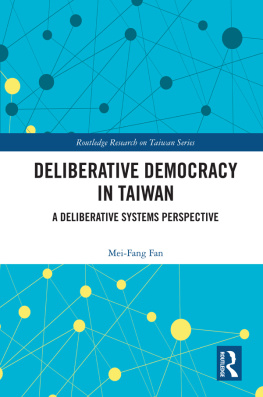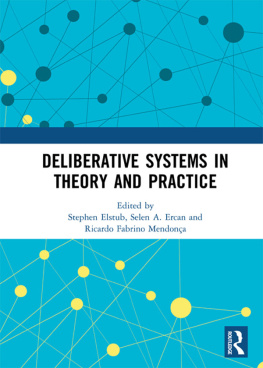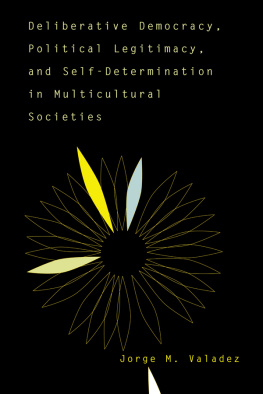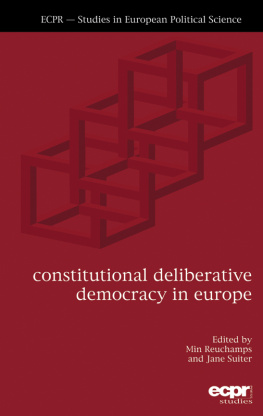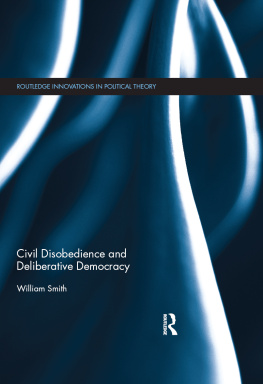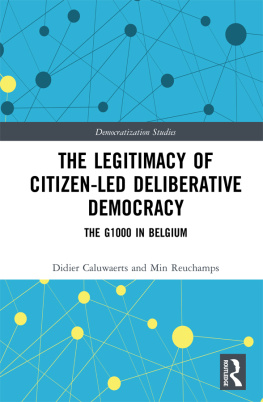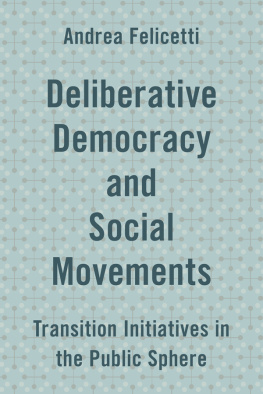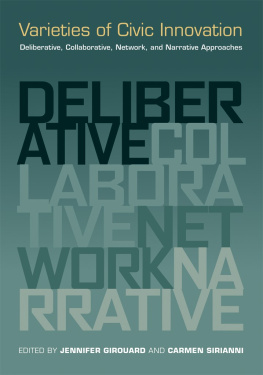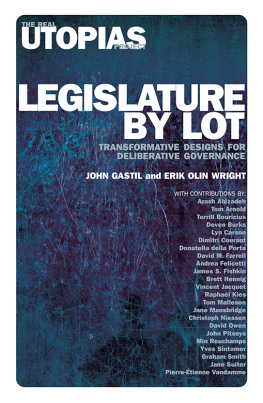Deliberative Democracy in Taiwan
This book is a pioneering analysis of the deliberative systems approach in Taiwan, extending our understanding of Taiwanese democratic politics and consolidating links between theoretical development and the practical application of deliberative practices.
As a front-runner of new democracies in Asia and a relatively open society, Taiwan provides a model for deliberative governance, with a view towards institutional innovation and increasing democratisation. This book considers how components within the intricate web of micro- and macro-deliberative systems perform different functions, complement each other and contribute both to policy change and democratic and deliberative innovations. Specific cases are provided such as participatory budgeting in Taipei City and the governmentacademia alliance model to demonstrate the long-term systemic effects of mini-publics and citizen actions. In addition, the book proposes the possibility of deliberative democracy for other countries in the world, alongside various policy issues, including mini-publics, e-participation, co-governance, citizen science, negotiation mechanisms and the deliberative practices of indigenous peoples.
Deliberative Democracy in Taiwan will appeal to students and scholars of East Asian studies, Taiwanese politics, political science and social movement studies.
Mei-Fang Fan is Professor at the Institute of Science, Technology and Society, National Yang-Ming University and Researcher at the Risk Society and Policy Research Centre of National Taiwan University. Her research interests include environmental justice, deliberative democracy and governance. Fans recent book chapters on environmental justice in East Asia and wind turbine construction in Taiwan appeared in the Routledge Handbook of Environmental Justice (2018) and Energy Transition in East Asia (2017).
Routledge Research on Taiwan Series
Series Editor: Dafydd Fell, SOAS, UK
The Routledge Research on Taiwan Series seeks to publish quality research on all aspects of Taiwan studies. Taking an interdisciplinary approach, the books will cover topics such as politics, economic development, culture, society, anthropology and history.
This new book series will include the best possible scholarship from the social sciences and the humanities and welcomes submissions from established authors in the field as well as from newer authors. In addition to research monographs and edited volumes, general works or textbooks with a broader appeal will be considered.
The Series is advised by an international Editorial Board and edited by Dafydd Fell of the Centre of Taiwan Studies at the School of Oriental and African Studies.
Positioning Taiwan in a Global Context
Being and becoming
Edited by Bi-yu Chang and Pei-yin Lin
Young Adults in Urban China and Taiwan
Aspirations, expectations, and life choices
Dsire Remmert
Taiwan Studies Revisited
Dafydd Fell and Hsin-Huang Michael Hsiao
Cross-Strait Relations Since 2016
The end of the illusion
J. Michael Cole
Deliberative Democracy in Taiwan
A deliberative systems perspective
Mei-Fang Fan
For more information about this series, please visit: www.routledge.com/Routledge-Research-on-Taiwan-Series/book-series/RRTAIWAN
Deliberative Democracy in Taiwan
A deliberative systems perspective
Mei-Fang Fan
First published 2021
by Routledge
2 Park Square, Milton Park, Abingdon, Oxon OX14 4RN
and by Routledge
52 Vanderbilt Avenue, New York, NY 10017
Routledge is an imprint of the Taylor & Francis Group, an informa business
2021 Mei-Fang Fan
The right of Mei-Fang Fan to be identified as author of this work has been asserted by him/her/them in accordance with sections 77 and 78 of the Copyright, Designs and Patents Act 1988.
All rights reserved. No part of this book may be reprinted or reproduced or utilised in any form or by any electronic, mechanical, or other means, now known or hereafter invented, including photocopying and recording, or in any information storage or retrieval system, without permission in writing from the publishers.
Trademark notice: Product or corporate names may be trademarks or registered trademarks, and are used only for identification and explanation without intent to infringe.
British Library Cataloguing-in-Publication Data
A catalogue record for this book is available from the British Library
Library of Congress Cataloging-in-Publication Data
Names: Fan, Mei-Fang, author.
Title: Deliberative democracy in Taiwan : a deliberative systems perspective / Mei-Fang Fan.
Identifiers: LCCN 2020028400 | ISBN 9780367407377 (hardback) |
ISBN 9780367809607 (ebook)
Subjects: LCSH: Deliberative democracyTaiwan.
Classification: LCC JQ1536 .F36 2020 | DDC 320.951249dc23
LC record available at https://lccn.loc.gov/2020028400
ISBN: 978-0-367-40737-7 (hbk)
ISBN: 978-0-367-80960-7 (ebk)
Typeset in Times new roman
by Newgen Publishing UK
Contents
PART I
Complex interactions of micro- and macro-deliberative systems
PART II
Deliberative policy-making and democratic innovations
Deliberative democracy is the main theme in recent democratic theory. Increasingly it is also applied to the empirical study of democracy and to the practicalities of institutional design. In the last decade or so, deliberative democracy has increasingly emphasized the idea of deliberative systems. For some time, exhortations to use the deliberative systems approach have been much more common than real applications of it; still fewer are real applications that are done well. That is beginning to change, but it is rare indeed that anyone takes on a whole country in deliberative system terms. Mei-Fang Fan undertakes here what I believe to be the first book-length treatment that interprets the whole political system of a country as a potentially deliberative system. That system extends from local civic practice to the formal institutions of national government, encompassing Parliament, civic organizations, indigenous peoples, social movements, local governments, designed citizen forums, experts and social media.
Deliberative Democracy in Taiwan is, then, a truly pioneering book. Of course it should interest scholars, students and others who care about Taiwanese politics, as it provides a fresh and insightful angle on this democratizing society. But it should also be read by people in the deliberative democracy field worldwide, as an exemplary (as well as pioneering) application of the deliberative systems approach, showing exactly how it can be brought to bear at a whole-country level.
Taiwan is a particularly interesting case given that, among Asian countries, it is at the forefront in both conventional liberal democratic terms and in deliberative innovations. Many of these innovations appear in the book. But, true to the systems frame, these innovations are treated in terms of how they influence and interact with larger deliberative systems. Some of the innovations, such as mini-publics and participatory budgeting, can be found in other countries too. Others, such as Citizens Congress Watch (which monitors the performance of individual parliamentarians in deliberative terms) are Taiwan originals that deserve to be copied elsewhere. There is much that the world can and should learn from Taiwan when it comes to deliberative democratic possibilities. Of course, Taiwan is not perfect in deliberative terms, and Fan shows how its deliberative qualities could be deepened.

